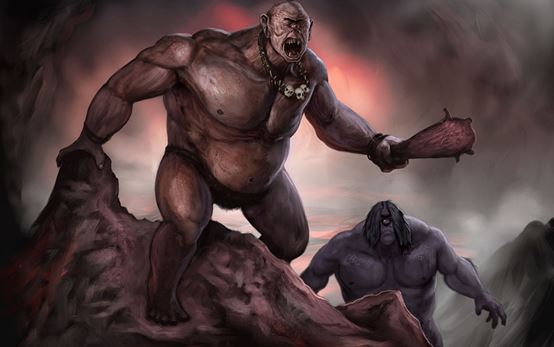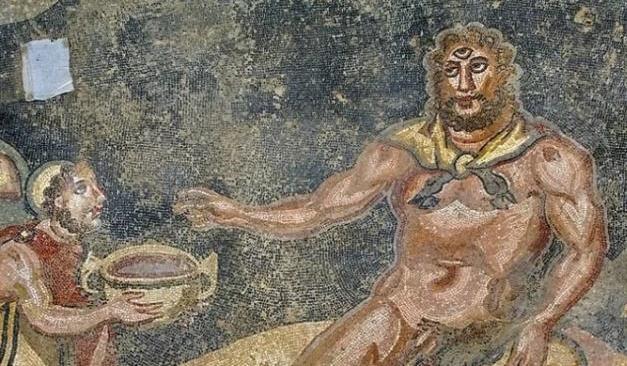Cyclopes — gigantic, one-eyed beings

The Cyclopes (singular: Cyclops) were gigantic, one-eyed beings with enormous strength. Originally, there were three of them: Arges, Steropes, and Brontes; capable blacksmiths, these were the sons of Uranus and Gaea and the brothers of the Hecatoncheires and the Titans. They were imprisoned by Cronus but released by his son Zeus, for whom they forged his famous thunderbolt as a sign of gratitude. However, at a later time, poets spoke of a different type of Cyclopes, a race of dim-witted and violent one-eyed shepherds dwelling in the caves of the island of Sicily. The most famous among them was Polyphemus, the Cyclops who fell in love with Galatea and was eventually blinded by Odysseus.
Cyclopes Name
The word “cyclops” can be literally translated as “round-eyed,” but many authors feel that it is derived from a much older word which originally meant “sheep thief.”
Two Types of Cyclopes
Even though they appear to have shared their most distinctive features between them, there seems to have been two very different types of Cyclopes in Ancient Greek mythology. Hesiod’s Cyclopes are three gigantic and divine blacksmiths, sons of Uranus and Gaea, residents of Olympus; Homer’s are a race of enormous and violent shepherds related to Poseidon and dwelling in the world of humans.
Zeus, the Cyclopes, and the Titanomachy
In time, however, the Cyclopes and the Hecatoncheires were released from Tartarus by the only one of Cronus’ children not to be eaten by him at birth: Zeus. Zeus did this at the advice of Gaea, who had informed him that he wouldn’t be able to depose Cronus without their help. True to Gaea’s words, the Cyclopes played a crucial part during the Titanomachy.
The Death of the Cyclopes
It seems that all three of these original Cyclopes met an untimely death at the hands of the Olympians. First Arges was killed by Hermes while guarding Io against the lust of Zeus; then, Apollo killed both Steropes and Brontes in an act of vengeance for the death of his beloved son, Asclepius. In truth, the Cyclopes had nothing to do with his death, other than forging the thunderbolt which Zeus hurled in the direction of Asclepius. But, obviously enough, Apollo couldn’t exact his revenge on Zeus himself, so Steropes and Brontes had to suffer his wrath in Zeus’ stead.

Homer’s Cyclopes
Homer’s Cyclopes were a race of unintelligent and ferocious shepherds living on the island of Sicily – at least from what we can infer from the “Odyssey” and later works inspired by it. The most famous among them, Polyphemus, was the son of Poseidon and the nymph Thoosa, and he had a famous encounter with Odysseus.
Portrayal
Even though they also had only one eye and were as gigantic as Hesiod’s Cyclopes, Homer’s Cyclopes were neither blacksmiths nor obedient. Usually portrayed as violent cannibals, they led an unruly life, possessing neither social manners nor fear for the gods.
The chief representative of Homer’s Cyclopes was the man-eating monster Polyphemus, described by Homer as having been blinded and outwitted by Odysseus. Later authors make him a would-be lover of the nymph Galatea.

Polyphemus and Galatea
Long before being blinded by Odysseus, Polyphemus had fallen in love with a beautiful nymph called Galatea. However, as it may be supposed, his actions were neither graceful nor acceptable to the fair maiden, who rejected them in favor of a youth named Acis, the handsome son of Faunus and the river-nymph Symaethis. Polyphemus, enraged and with his usual barbarity, killed his rival by throwing upon him a gigantic rock. The blood of the murdered Acis, gushing out of the rock, formed a stream which bears his name to this very day.
Polyphemus and Odysseus
Upon landing on the island of the Cyclopes, Odysseus and his sailors found themselves entrapped in the cave of Polyphemus. The Cyclops ate six of Odysseus’ men, and Odysseus had no option but to devise a quick escape plan. So, one night, he intoxicated Polyphemus and pierced his eye with a wooden stake; the next morning, he told his men to hide under the bellies of Polyphemus’ sheep, and thus he managed to smuggle them out of the cave. It was because of this act that Poseidon, Polyphemus’ father, held a decade-long grudge against Odysseus, keeping him away from Ithaca and his beloved wife, Penelope.